SGA issues budget cuts to Maryville College clubs and organizations
Maryville College clubs and organizations may be feeling financial hurt this year as SGA institutes blanket budget cuts. Kelton Bloxham, Student Body President, and Andrew Hastings, Student Government Association (SGA) Treasurer, said that these cuts would provide an equitable solution to keeping the SGA budget in check. “Depending on how much a club requests, they were either cut [by] 26% or 31%,” Hastings said.
If you have ever wondered where Maryville’s clubs and organizations receive funding, open your online Self-Service account and take a look at your itemized bill. Each student is charged an Activity Fee as part of their tuition. Half of this fee goes to “campus engagement opportunities”; this includes things like free admission to athletic events and reduced ticket costs at the Clayton Center. The other half goes to SGA and is run through a budgetary process. SGA determines how the money is distributed based on the budgets each club or organization submits.
Each budget is brought before the Financial, Budgetary, and Organizational Affairs Committee (FBOAC), which is chaired by Hastings and consists of elected class secretary treasurers, as well as any SGA members or other students who want to serve on the committee. “My committee’s job is to go through and cut the budget…and make sure that it is appropriate within the number that we estimate from the business office to give, based on Student Activity Fee numbers, and then make sure money is left over for SGA,” said Hastings.
Two organizations significantly impacted by these budget cuts are the campus newspaper, The Highland Echo, and the literary magazine, Impressions. Those majoring in Writing Communication are required to participate in either organization, and both serve the student population by informing and entertaining the campus community and by spotlighting student writers and artists.
Both received budget cuts that affect their ability to print. In recent years, the Echo has printed three issues per semester, publishing the other three exclusively online. Due to limited funding this year, as it stands, the Echo will be unable to print in the spring semester.
This is a problem, as people who give their time in interviews and are featured in stories want physical copies of the papers. Print copies are also a great way to archive the history of Maryville College, providing records for future generations of Scots and their families.
Impressions, which publishes student work in an annual literary magazine, is also wondering how they will come up with the funds to publish their literary magazine in the spring, which comprises prose, poetry and artwork submitted by the students of Maryville College.
Another financial hit to clubs and organizations this year is the reinstatement of the reclamation process, a policy placed on hold during the COVID-19 pandemic, that requires that any leftover funding from the fall semester be reabsorbed by SGA for redistribution as they see fit.
On top of blanket cuts and the reinstatement of the reclamation policy, if an organization or club leader misses the monthly President’s Roundtable meeting, they suffer an additional 5% cut per absence.
With these financial blows being dealt to clubs and organizations, what can they do if they find themselves in a financial pickle?
One option is to appeal for more funds. Budgetary hearings are in place for organizations and clubs to appeal if they are unsatisfied with their funding. The hardship with this process, though, is that it doesn’t provide long-term solutions for larger organizations like that of Impressions, who are consistently running on a budget much smaller than its sister publication, The Highland Echo.
They can also request funds from the SGA General Fund. Bloxham said, “…any money that we get on top of our General Operating Budget is called the General Fund. [This] is where students can come to, and student organizations and clubs can come to, to ask for help and ask for financial assistance throughout the school year.”
Luckily, these policies may not be in place long-term. Due to a large amount of feedback regarding budget cuts at the last budgetary hearing, SGA is looking to revise the process, but changes would not take place until the next fiscal year.
“We have a lot of student organizations that we have to help, so that’s why it’s so hard sometimes for us to really cater to everyone because we have so many people requesting so much money. How do we go about it in the best process? And frankly, that’s never going to make everyone happy, but it’s the best possible way we can make it equitable,” said Hastings. Bloxham added, “There is always room to improve.”
FBOC meetings are closed to students, but all students can attend budget hearings. SGA meetings are also open to any student who wishes to attend. They take place every Thursday from 12:30 p.m. – to 2 p.m. in Thaw 216.

